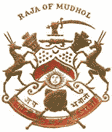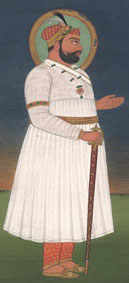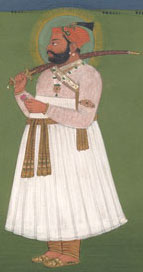
Links
THE SERVICE UNDER THE BAHAMANI KINGS
EARLY HISTORY OF THE FAMILY, MUDHOL
When Hamir was declared Rana, Sujansinha and Ajabsinha lost all hope of the
throne. Ajabsinha went so far as to commit suicide, and Sujansinha leaving
Kilawada proceeded a little distance to the south and settled there. Intending
to try his luck with a trusty band of followers, Sujansinha joined the
Muhammedan army in the South.
 The
Musalman General, under whom Sujansinha took service, was one Hasan Gango on
whom the title of Jafarkhan was bestowed by the Emperor of Delhi. Shortly
after Sujansinha's taking service under him, Jafarkhan declared his independence
from the throne of Delhi. He then assumed the title of Allaudin Hasan.
Mahammad Taglakh, the Emperor of Delhi, marched towards the Deccan with the
object of putting down the rebellion of Jafarkhan. Jafarkhan gave battle
to his whilom master. Sujansinha and his son Dilipsinha proved their valour on
the side of Jafarkhan. They withstood the attacks of the Imperial army.
Fortunately for Jafarkhan, Muhammad Taglakh heard of another disturbance in
Gujarat and had to give up the invasion against Jafarkhan. Jafarkhan was very
much pleased and was grateful to his new Sardar Sujansinha. Moreover, the father
and the son were the favorites of one Saifudin, the Chief Adviser of the
Emperor. Sujansinha and his son got the Jahagir of many villages in the province
of Mirat under the Devgiri Subha. This Jahagir is, up to this day, in the
enjoyment of the descendants of Sujansinha.
The
Musalman General, under whom Sujansinha took service, was one Hasan Gango on
whom the title of Jafarkhan was bestowed by the Emperor of Delhi. Shortly
after Sujansinha's taking service under him, Jafarkhan declared his independence
from the throne of Delhi. He then assumed the title of Allaudin Hasan.
Mahammad Taglakh, the Emperor of Delhi, marched towards the Deccan with the
object of putting down the rebellion of Jafarkhan. Jafarkhan gave battle
to his whilom master. Sujansinha and his son Dilipsinha proved their valour on
the side of Jafarkhan. They withstood the attacks of the Imperial army.
Fortunately for Jafarkhan, Muhammad Taglakh heard of another disturbance in
Gujarat and had to give up the invasion against Jafarkhan. Jafarkhan was very
much pleased and was grateful to his new Sardar Sujansinha. Moreover, the father
and the son were the favorites of one Saifudin, the Chief Adviser of the
Emperor. Sujansinha and his son got the Jahagir of many villages in the province
of Mirat under the Devgiri Subha. This Jahagir is, up to this day, in the
enjoyment of the descendants of Sujansinha.
Dilipsinha got
another opportunity of distinguishing himself. There was a dispute between the
Bahamani Emperors and the Kings of Vijayanagar about the boundaries of their
respective kingdoms. This dispute had to be settled by regular war. Dilipsinha
fought on the side of the Bahamani Kings at the head of 2,000 spearmen. It was
the valour of Dilipsinha and his Rajput followers, which decided the battle in
favour of the Bahamani Kings to the utter discomfiture of the Vijayanagar
armies. Dilipsinha was greatly honored and received substantial favours from
the successful Emperors. Dilipsinha died about the year H.766 after a strenuous
and eventful service of 13 years.
Shidhaji, the young son of Dilipsinha, succeeded his father in the service of the Bahamani Kings. Shortly afterwards Mahammadshaha died and was in his turn succeeded by his son, Mujahidshaha. Mujahidshaha being a wrestler himself liked men of fine physique. Shidhaji who was endowed with strength and valour was honored with the post of bodyguard to the person of the Emperor, Mujahidshaha ruled for a time, made enemies and was eventually murdered by his uncle Daudkhan. Daudkhan succeeded his nephew, but was treacherously murdered at the instigation of Mujahidshaha's sister on the seventeenth day of his reign.
There was a plot to place Muhammad Sanjar, a son of Daudkhan, on the throne, but Rukhaparwar succeeded in getting Sultan Muhammad crowned as Emperor. The reign of this Sultan was famous for peace and prosperity except for a, small rising. One Bahaudin was a Thanedar of the Sagar Fort. His two sons Muhammad and Khaja lived near the Emperor. Their enemies poisoned the Emperor's ears against them. Through fear of the King's displeasure, they fled to their father, and the father and the sons raised a rebellion. They were thoroughly put down and Sidhaji was appointed Thanedar of the Sagar Fort for the long and faithful service rendered by him.
Sultan Muhammad was succeeded by his son Ghiasuddin. Shortly after his ascending the throne, his eyes were treacherously put out and his brother Shamsuddin succeeded to the throne. It was in this reign that Ferozshaha and Ahmadkhan, the sons of Daudkhan, began to be conspicuous in the kingdom. Shamsuddin's mother became jealous and tried to get these brothers arrested. They fled towards Sager Fort, where Shidhaji took up their cause and declared Ferozshaha as Ferozshaha Bahamani. He himself took the title of "Sarnobat” and marched towards the capital with the intention of making Ferozshaha the de facto Emperor. But the overwhelming Imperial army routed Shidhaji's army in a battle fought on the frontier of Martur near Gulburga. Bhairavji, the son of Shidhaji, distinguished himself in this unsuccessful battle. Shidhaji was killed in the battle in H.789. He served his Emperor for 31 years through thick and thin.
Being undaunted by this defeat, Ferozshaha gained his end through treachery and ascended the Bahamani throne in H. 800. Having ascended the throne, Ferozshaha took good care to show his sense of obligation to his friends and allies. Shidhaji had lain down his life while fighting for Ferozshaha and Bhairavji had done his utmost. As a mark of gratitude Ferozshaha conferred -the Jahagir of Mudhol on Bhairavji. The Emperor issued a Farman on the 25th of Rabilaval H.800 granting to Bhairavji and his descendants the Jahagir of Mudhol with the 84 villages under it. It was from this Bhairavji or Bhosaji that the family got the surname of Bhosale. This Bhairavji played a prominent part in the reign of Ferozshaha Bahamani. During the reign of Ferozshaha Bahamani the chieftains in some part of Raibag Subha raised a disturbance. In subduing them, Bhairavji with his two sons Devraj and Karanasinha manifested the Rajput prowess to a considerable extent. Karanasinha was killed in the engagement in H. 815, Bhairavji also was concerned in the attempt to bring about peace between the Bahamani and Vijayanagar Kings. Bhairavji died in H. 800 after serving his master for 11 years.
His son Devraj succeeded to the Jahagir, which was conferred in his name by Ferozshaha. Devraj served his Emperor for 16 years and died in H.825, i.e., shortly after the death of Ferozshaha. Ferozshaha was succeeded by Allauddin Ahmadshaha, the brother of Ferozshaha. Shortly after ascending the throne, Allauddin marched against the kingdom of Vijayanagar with the intention of avenging a former defeat. He was successful in routing the Vijayanagar army which shut itself up in the Fort. During the siege that followed the Emperor had gone ahunting with a small party. He was surprised by a batch of the besieged army and would have been captured by the enemy but for the valour of Ugrasen, the son of Devraj, and his followers. The king was quite pleased with his General Ugrasen and conferred honours on him in H.827.
During the reign of Allauddin the brothers, Ugrasen and Pratapsinha, conquered for their Emperor some forts in the Konkan after many deeds of valour. For this, they got as jahagir a big tract in the Wai Paragana. These battles were fought with the famous Maratha kings who ruled kings who ruled either in -the Konkan or on the Ghats.
Many a time, victory crowned the opponents of the Bahamani Emperors also. About the year H.845 during one of these unfortunate defeats, Ugrasen fell a captive in the hands of the enemy (H.858; A.D.1453). Pratapsinha and Ugrasen's sons Karanasinha and Shubha Krishna carried on the battle for two or three years and succeeded in capturing the fort of the enemy and in releasing Ugrasen. After the death of Ugrasen, his two sons served as generals under the Emperor, but owing to some misunderstanding, the younger brother Shubha Krishna and his uncle Pratapsinha went and settled near about the year H. 865(A.D.1460).
Meanwhile war was being waged in the Konkan against a Chief named Shankarrao. It was this Chief who had defeated Malikuttajar in A.D.1453 and made Ugrasen captive. While fighting against this Shankarrao, Karansinha, the eldest son of Ugrasinha, with his son Bhimsinha showed great prowess and captured the enemies' fort after heroic deeds. The Emperor conferred high honours on the Sather and son.
Muhammad Gavan was the Commander-in-Chief of the army in A.D. 1469. Fourteen years before this, in the year A.D.1455, the enemies in the Konkan had gained a victory over the army of the Bahamani Emperor. They had become quite elated by that victory. Meanwhile the armies of the Bahamani Kingdom being engaged in fighting the Subhedar of Malva, had had no time to avenge the defeat of A.D.1455· The Bahamani Kingdom suffered a great deal from the enemies during- this interval. The Konkan enemy took back some portion of the Wai Paragana, but when a fitting opportunity for an invasion offered itself, Muhammad Gavan, an experienced and well-known minister of the Bahamani Emperors, was himself sent against these rebels. It usually happened that the Muhammedan armies marched in the Konkan after the rainy season, defeated the enemies and subdued them. But no sooner did the rains set in, than the vast army was hindered by the flooded rivers and streams to provide itself with food and provisions in that hilly tract. Moreover, the residents themselves were short of food-stuffs usually. Under such circumstances it was quite impossible for a vast army to get its food-stuffs in the barren hills. Owing to these advantages the hilly tribes could face and fight the Imperial army and could go back to their agriculture during the rainy season.
In A.D.1469, the Imperial army had for the last time surrounded the enemies' forces. The rainy season was fast approaching. Had the siege been raised, the Imperial army would have been obliged next year to begin from the beginning and conquer the whole country again. Therefore Karansinha and Bhimsinha resolved to conquer the enemy and capture their fort by some stratagem or other, before the rains set in. One night, they tied a rope to the waist of an iguana and took it to the fort-wall together with a select body of men. They tied a short pipe to the head of the iguana, so that it should be able to see in the front only and should climb straight. In this way they set up three or four iguanas. One of these climbed the fort-wall up to a certain height. With the help of the rope tied to the iguana, a man attained the height reached by the iguana and thence another iguana was set up which went up to a certain extent and helped the man to attain the higher stage. In this way the top of the fort wall was reached. Rope-ladders were then tied to the top of the fort-wall and many people climbed the fort-wall by the help of the rope-ladders. They attacked the guard on the principal gate and killed them and opened the gates. The enemies thought that it was impossible to climb the steep fort-walls and so they were taken quite unawares, and the besiegers accomplished the raid quite successfully. During this skirmish, Karnasinha was wounded and died in his master's cause. As previously settled the besieging army entered the fort as soon as the gates were opened and the fort was captured. For having thus bravely captured the fort, the Emperor conferred many honours upon Muhammad Gavan, the Commander-in-Chief, and gave Bhimsinha the distinguished title of "Raja Ghorpada Bahadur." In addition to this, Bhimsinha was made the General of three thousand.
When the victorious General Muhammad Gavan and Bhimsinha returned to the capital, the emperor himself gave them robes of honour. From that memorable occasion the family of Bhimsinha began to attach, "Raja" instead of "Rana" to their names. After this event they began the use of Ghorpade as their surname. The branch of Shubha Krishna continued to call itself Bhosales. They lived at their Jahagirs in the Mirat Province and continued to serve the Emperor as Sardars. That branch distinguished itself in the year A.D.1470.
After staying for a while in his Jahagir for the purpose of settling matters in general, Bhimsinha returned to the capital where matters were in a turmoil. There were two distinct parties in the State, one of the foreigners and the other of the Deccanees. In consequence of these internal disputes, the Emperor was induced to go to the length of getting Muhammad Gavan, the loyal statesman and warrior, killed in A.D.1481. By the death of Muhammad Gavan not only did the whole kingdom suffer a great loss, but there were internecine disputes in the whole of the kingdom and eventually the Bahamani Kingdom came to its end.
Before this in A.D.1482-83, a great invasion was sent against Goa. Usaf Adilkhari was sent on his mission from Belgaum. The army of Vijayanagar also marched towards Goa at this juncture. During this invasion Bhimsinha showed bravery of the highest type. The whole of the Goa army returned to the capital in A.D. 1489, but owing to the disunion in the metropolis, the Deccanee army stationed there attacked returning forces and would have annihilated everything, but the situation was saved by the returning forces, which were successful in defeating the Deccanees. After this event Adilkhan and his army, together with his partisans, returned to their respective Jahagirs.